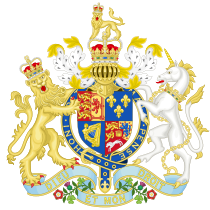The Act of Six Articles 1539 (31 Hen. VIII c. 14),[1] also known as the “Whip with Six Strings” because of the harsh punishments it introduced for religious nonconformity,[2] was a set of “highly reactionary”[1] statements interpreted by many to be intended as a curb on excessive Protestant reform.[2]
England was at the time in religious turmoil, following Henry VIII’s break with the Catholic Church and his excommunication in 1533. Impatient Protestants took it upon themselves to pursue further reforms; some priests began saying mass in English instead of Latin, and married without authorisation. English Protestants were divided between reformers who held Lutheran beliefs maintaining the real presence of Christ in the Eucharist, and radicals such as the Anabaptists who did not.[3]
A new Parliament met in May 1539, and Lord Chancellor Audley told the House of Lords that the King desired religious uniformity. A committee of four conservative and four reformist bishops was appointed to examine and determine church doctrine.[4] On 16 May the Duke of Norfolk noted that the committee had not agreed on anything, and proposed that the Lords examine six controversial doctrinal questions that became the basis of the Six Articles:[5][6]
- Whether the Eucharist could be the true body of Christ without transubstantiation
- Whether it needed to be given to the laity under both kinds [bread and wine]
- Whether vows of chastity needed to be observed as part of divine law
- Whether clerical celibacy should be compulsory
- Whether private (votive) masses were required (legitimate) by divine law
- Whether auricular confession – confession to a priest – was necessary as part of divine law
All but the sixth point were put into law in June 1539; although auricular confession was considered to be “expedient and necessary to be retained”, it was not required by divine law.[5]
The Act introduced harsh penalties: denial of transubstantiation was punishable by burning, without an opportunity to recant, and denial of any of the other articles was punishable by hanging or life imprisonment.[7] Married priests were allowed until 12 July to put away their wives, which was probably a concession granted to give Archbishop Cranmer time to move his wife and children out of England.[8]
The Act was repealed in 1547 in the first Parliament of Henry VIII’s successor, Edward VI, the first Protestant English king.[9]
This article may contain text from Wikipedia, released under the Creative Commons Attribution-ShareAlike License.

